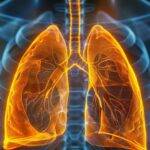Pulmonary Edema
Pulmonary edema is a medical condition that involves the accumulation of fluid in the lungs, leading to breathing difficulties and potentially severe complications. This comprehensive guide aims to provide you with a detailed understanding of pulmonary edema, covering its causes, symptoms, available treatments, and more.
Pulmonary Edema: What is it?
The disease refers to the abnormal buildup of fluid in the air sacs and tissues of the lungs. This condition can occur suddenly (acute pulmonary edema) or develop gradually over time (chronic pulmonary edema). It often results from an underlying medical condition affecting the heart or lungs, disrupting the normal mechanisms that regulate fluid balance.
Causes
The disease can stem from various underlying causes, including:
- Heart Conditions: Congestive heart failure, heart attack, and heart valve problems can lead to the inadequate pumping of blood, causing fluid to accumulate in the lungs.
- Kidney Dysfunction: Impaired kidney function can result in fluid retention, increasing the risk of pulmonary edema.
- High Altitudes: Rapid ascent to high altitudes can cause altitude sickness, leading to fluid leakage into the lungs.
- Infections: Severe infections like pneumonia can contribute to pulmonary edema.
- Toxin Exposure: Inhalation of toxic fumes or chemicals may trigger lung inflammation and fluid buildup.
- Certain Medications: Some medications, particularly those affecting blood pressure, might play a role in edema development.
Recognizing the Symptoms
The symptoms can vary but often include:
- Shortness of breath, especially during physical activity or when lying down.
- Persistent coughing, sometimes with pink or blood-tinged sputum.
- Wheezing and rapid breathing.
- Feeling of suffocation or anxiety due to difficulty in breathing.
- Fatigue and weakness.
Diagnosis and Medical Evaluation
If the disease is suspected, a thorough medical evaluation is essential. This may involve:
- Physical examination, including listening to the lungs and heart.
- Chest X-rays to visualize any fluid accumulation.
- Echocardiogram to assess heart function and structure.
- Blood tests to evaluate oxygen levels and kidney function.
Treatment Options of Pulmonary Edema
The treatment approach for pulmonary edema depends on its underlying cause and severity. It may involve:
- Oxygen Therapy: Supplemental oxygen helps improve oxygen levels in the blood.
- Diuretics: Medications that promote urination can help eliminate excess fluid.
- Nitrates: These medications help dilate blood vessels and reduce the workload on the heart.
- Morphine: In severe cases, morphine can help reduce anxiety and ease breathing.
- Treating Underlying Conditions: Addressing the root cause, such as heart failure or kidney dysfunction, is crucial.
Lifestyle Modifications and Prevention
Several lifestyle changes can help prevent or manage the disease:
- Maintain a Healthy Weight: Obesity strains the heart and lungs, increasing the risk of edema.
- Follow a Balanced Diet: Limiting salt intake can help prevent fluid retention.
- Regular Exercise: Engaging in physical activity supports heart and lung health.
- Manage Chronic Conditions: Effectively manage conditions like diabetes and hypertension.
- Avoid Smoking: Smoking damages the lungs and worsens pulmonary function.
Frequently Asked Questions (FAQs)
Q: Can the disease be a life-threatening condition?
A: Yes, severe cases of the disease can be life-threatening if not promptly treated. It’s crucial to seek medical attention if you experience symptoms.
Q: Are there any long-term complications of pulmonary edema?
A: Chronic or recurrent pulmonary edema can lead to lung damage and contribute to the progression of underlying heart or lung conditions.
Q: How is chronic version of the disease different from acute pulmonary edema?
A: Chronic case develops gradually over time, often because of untreated heart or lung conditions. Acute case of the disease, on the other hand, occurs suddenly and requires immediate medical attention.
Q: Can altitude sickness lead to the disease?
A: Yes, altitude sickness can lead to high-altitude pulmonary edema (HAPE), a potentially serious condition caused by fluid accumulation in the lungs at high elevations.
Q: Is the disease reversible with treatment?
A: With prompt and appropriate treatment, many cases can be effectively managed and even reversed. However, addressing the underlying cause is crucial for long-term management.
Q: Are there any self-care measures for managing the disease at home?
A: While self-care measures can support overall heart and lung health, this disease often requires medical intervention. It’s essential to consult a healthcare professional for proper diagnosis and treatment.



